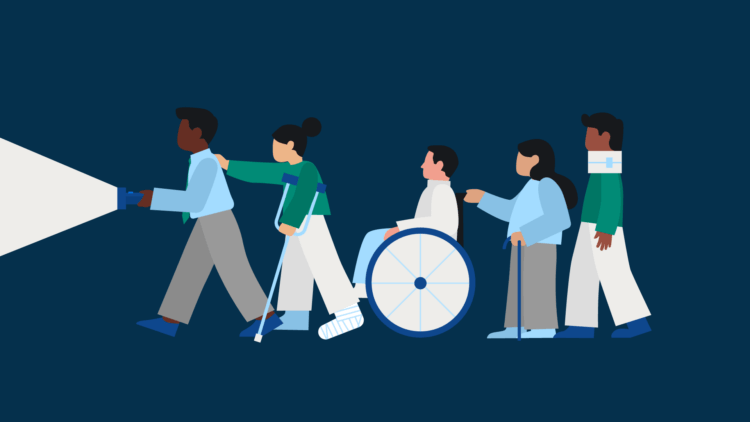For many, life after prison is far from simple. Laura Merchant, a Reentry Hotline Attorney at Root & Rebound, explains what a typical situation might look like:
People call us, and they know they’re going to get released. They’ve been in prison for maybe 15 years, so they’ve never used a smartphone. They might not have housing. They might no longer have identification. They get released with $200 gate money and then they use most of that to travel to the county that they’ll be on parole in.
They really are starting from scratch in terms of rebuilding their lives, especially if they don’t have family or friends to support them in the place that they’ll be on parole in.
Root & Rebound was founded by Katherine Katcher to better prepare people for reentry after prison and jail. At first, the organization worked with people one-on-one, but they soon realized that the need for help with reentry was greater than this traditional model could meet.
According to Root & Rebound’s website, 50,000 people are released from prison in California every year, with thousands more cycling in and out of county jails. They face approximately 48,000 documented federal, state, and local barriers to successful reintegration, including barriers to employment, housing, financial stability, and family reunification.
“This is a hugely overlooked population,” said Laura. “Conviction is something that follows people around for the rest of their lives.”
So Root & Rebound took a different approach. They produced and distributed the Roadmap to Reentry: A California Legal Guide to give people a resource to turn to when navigating the reentry process. They set up a reentry hotline so that people could access important information about reentry while still in prison, and they put on online and in-person training sessions to better educate formerly incarcerated people, as well as their families and communities.
“We realized we would be more effective if we could work to democratize legal information so that it’s accessible to everyone,” Laura explained.
Here’s a closer look at how Root & Rebound is maximizing its impact and improving access to justice.
1. Increasing access to information with a helpful guide
The Roadmap to Reentry has been a critical part of how Root & Rebound supports those reentering society after prison. At nearly 1,100 pages, it covers nine areas of law and civic life, including education, employment, and advice for cleaning up one’s criminal record.
It also starts with a reentry-ready checklist for people who are currently incarcerated, and a short guide to practicing mindfulness, to help people better cope with the stress of reentry.
The guide is certainly in demand. Root & Rebound receives over 500 letters per week from people who are currently incarcerated, mostly requesting the Roadmap to Reentry guide. Most prisoners in the US don’t have access to the internet, and Laura says that information scarcity and flat-out misinformation prevent people from properly preparing for life after their release.
“People are shocked when we explain that you can’t access the internet when you’re in prison,” she said. “You can’t just Google something. If you want to know the address of a Social Security office, so you can write to them for forms in the county that you’ll be paroling to, you can submit a request to your correctional counselor, but you might have to wait six months to get a reply.”
For people who’ve been recently released and do have internet access, the situation isn’t much better—even as attorneys, those at Root & Rebound found it difficult to locate information on laws, support, and options for those reentering society after prison or jail.
In this case, the organization found it could make a big difference in the access to justice gap just by providing legal information regarding reentry in a clear, useable guide.
“We distribute that for free throughout the state,” said Laura. “We’ve sent out over 35,000 copies of it since we first published it in 2015. And we update it every year.” A searchable version is now also available online.
2. Answering specific questions with a legal hotline
The Roadmap to Reentry guide increases access to information around reentry, but of course, more specific or complex questions can still come up. For that, Root & Rebound has another solution.
“Every Friday we close our office and turn it into a reentry hotline where we accept collect calls from individuals who are in custody,” Laura explained. “We are the only organization in the state that does that, just because it’s so expensive with the connection fees and the cost per minute.”
Root & Rebound also accepts calls from family members, community members, or anyone who calls in with a reentry related question. There are usually four or five people available to take calls, and Laura estimates that the organization receives over 100 calls every Friday.
“Every single call you get in a given day could be about something completely different,” Laura said. “It can be intimidating, but it’s really about asking the right questions to understand what the person is calling about. If you can answer their question during the call, then that’s great. But if not, you can either have them call back after you do a little more research, or you can put together a letter to send to them.”
For issues requiring follow-up, Root & Rebound uses an intake form to collect the caller’s information and any key details about their situation. Everything gets recorded in Clio, and the attorney taking the call is responsible for any follow-up required. So far, she estimates that over 1,700 unique hotline matters have been logged in Clio.
“I really see the hotline as a lifeline to people to help them get clarification on any issues, and to get access to information,” Laura said. “We really want to be here to help people get the information that they need to be able to hit the ground running when they get released.”
You may like these posts
3. Educating communities with guides and training programs
In addition to providing resources for former inmates, Root & Rebound also provides community resources and training sessions to make reentry a smoother process for everyone involved.
For example, there’s the California Employers’ Fair Chance Hiring Toolkit to help employers explore how to give opportunities to people with records.
Its online training hub provides programs to those in reentry, their loved ones, and professionals working with those in reentry.
As Laura explained, there’s still a lot of education needed around the challenges of reentry and the support needed.
“Even the concept of reentry, the transition from incarceration back into a community … it wasn’t something that people talked about,” she said. “So it’s something that we have worked to define as a concept, as something that needs attention and support.”
The importance of reentry
Laura was formerly a patent lawyer, but she moved to Root & Rebound because she saw how the treatment of people in the criminal justice system was impacting their lives and their communities.
“I felt like as a lawyer I could actually use my skills to start to chip away at that,” she said. “It’s nice to work an issue that is ripe for change and reform, where there’s a big need. It’s overwhelming at times, given just how much needs to change, but it’s also really rewarding.”
With Root & Rebound’s model, Laura has been able to help maximize the impact of her skills, while still providing specific legal help where it’s needed.
“A lot of times people can do the advocacy on their own if only they know the right steps to take,” she said. “But, for example, if somebody has a parole condition that they think is unfair and that they want to challenge, we’re always here to help them work on that.”
With Clio, legal professionals around the world are doing amazing things in their communities. Read more of their stories.
We published this blog post in January 2018. Last updated: .
Categorized in: Uncategorized









